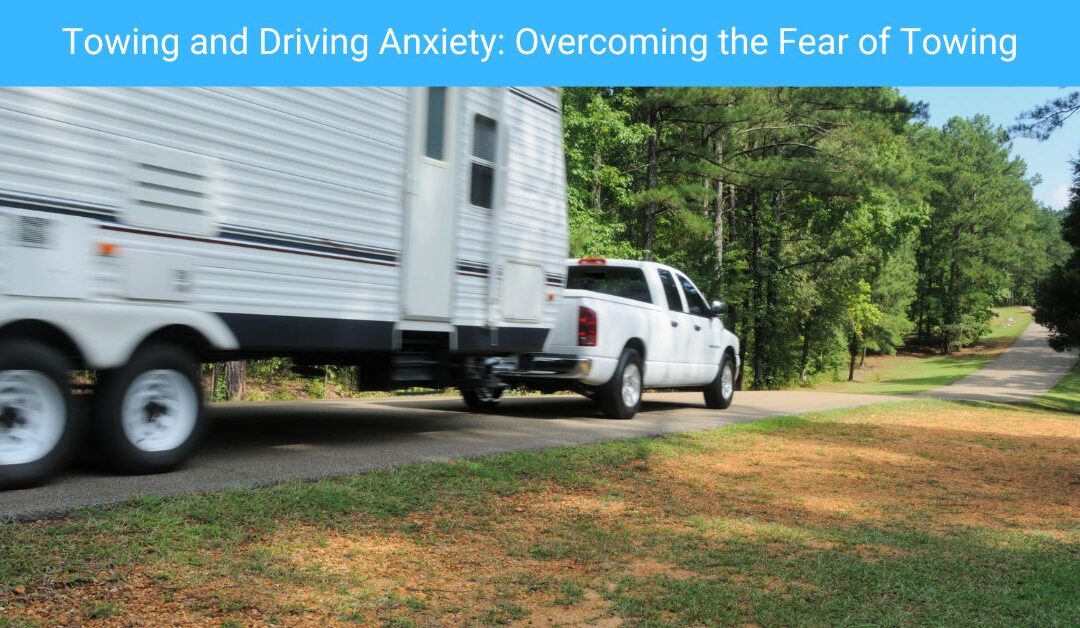For many drivers, the idea of towing a vehicle or trailer can be an intimidating experience. Whether it’s fear of causing an accident, worries about damaging the vehicle, or simply feeling overwhelmed by the size and weight of the load, towing anxiety is common. However, with the right approach, knowledge, and practice, these fears can be overcome. This article will explore the causes of towing anxiety and provide practical tips to help drivers build confidence and gain control over the towing experience.
Understanding Towing Anxiety
Towing anxiety can stem from various sources, all of which are tied to the added responsibility and unfamiliarity of towing. The primary fear is often related to the loss of control. When towing, drivers are dealing with an additional vehicle or load, which can change the way the vehicle handles, accelerates, and stops. The trailer or towed vehicle can affect the balance and stability of the tow vehicle, making drivers feel uneasy about their ability to manage the situation safely.
In addition to handling concerns, many drivers fear causing an accident or damaging the vehicle or trailer. The size and weight of the trailer can also increase the perception of risk, especially for drivers who are new to towing. Anxiety is often compounded by the unpredictability of road conditions, other drivers, and the unfamiliarity of the vehicle’s behavior when towing.
The Importance of Preparation and Education
One of the most effective ways to alleviate towing anxiety is through proper preparation and education. Understanding how towing works and what is required to safely tow a trailer or vehicle can help calm nerves. Before attempting to tow for the first time, educate yourself on the mechanics of towing, including how weight distribution, hitching, and braking systems work. Knowing the specific towing capacity of your vehicle is crucial in avoiding overloading, which can lead to dangerous situations.
Taking a towing course can also help build confidence. Many driving schools offer specialized courses that teach proper towing techniques, including how to handle turns, stops, and reversing while towing. By learning from professionals, you can gain practical skills and a deeper understanding of towing safety, which can significantly reduce anxiety.
Starting Small and Gaining Experience
For new towers or those experiencing anxiety, the best approach is to start small and gradually work up to more complex towing situations. Begin by practicing with a light load in a controlled, low-traffic environment such as an empty parking lot. This allows you to become accustomed to the feel of the vehicle and trailer without the pressure of other drivers around. Focus on basic maneuvers, such as starting, stopping, turning, and backing up, while practicing in a space where you have plenty of room to maneuver.
Once you feel more comfortable with basic operations, move to quieter roads where you can practice at low speeds. Gradually increase your towing experience by tackling slightly more challenging environments, such as areas with more traffic or uphill roads. With each successful experience, your confidence will grow, and towing anxiety will begin to decrease. This slow, incremental approach ensures that you’re not overwhelming yourself and helps you stay focused on each step in the process.
Understanding the Towing Vehicle and Trailer Dynamics
It’s important to understand the relationship between your tow vehicle and the trailer to ensure a safe and stable towing experience. Towing alters how a vehicle handles, so becoming familiar with how your vehicle behaves under load will help reduce anxiety. Pay attention to how the tow vehicle accelerates, brakes, and turns when connected to the trailer. Learn how the added weight of the trailer affects the stopping distance, and practice braking gradually to avoid jerking or skidding.
The dynamics of the trailer itself can also influence the towing experience. A well-balanced load will make the towing experience smoother and more stable, reducing the likelihood of swaying or fishtailing. Ensure the trailer is properly hitched and that the load is evenly distributed, with the majority of the weight toward the front of the trailer. Improperly loaded trailers are more prone to instability, which can increase anxiety.
Practicing Reversing and Parking
One of the most common sources of anxiety when towing is reversing and parking. The added length and width of the trailer can make it difficult to judge distances and angles, especially for those new to towing. However, these maneuvers can be mastered with practice.
When practicing reversing, start by using markers such as cones or poles in an open space. Go slowly and take your time, focusing on small adjustments. It’s important to remember that turning the steering wheel in one direction will cause the trailer to move in the opposite direction. This can feel counterintuitive at first, but with practice, it becomes second nature. If possible, enlist the help of a friend or family member to guide you during the learning process, as they can help with visibility and provide reassurance.
Parking in tight spaces or on an incline can also be challenging, but practicing in different scenarios will help you gain control over these situations. Always ensure that your parking brake is engaged, and check that the trailer is properly secured before leaving the vehicle.
Building Confidence Through Routine Checks
Before embarking on a towing journey, performing routine checks on both the tow vehicle and trailer can help alleviate anxiety. Knowing that your equipment is in good working condition will give you peace of mind. Begin by checking the tires, ensuring they are properly inflated and free of any visible damage. Inspect the trailer’s brakes, lights, and hitching system to make sure everything is secure and functioning correctly.
Additionally, practice setting up and hitching the trailer multiple times before you hit the road. Being familiar with the steps involved in preparing the trailer will reduce the stress of rushing through the process during the trip. Taking your time to ensure everything is in place will help you feel more in control and prepared.
Towing with a Supportive Passenger
If you’re still feeling anxious about towing, having a calm and supportive passenger can help ease your nerves. This person can offer guidance, provide reassurance, and help you stay focused during the trip. If possible, have someone familiar with towing accompany you, so they can offer practical tips and help you navigate any challenging situations.
Having a passenger on board can also assist with maneuvering the trailer and provide extra eyes on the road. If you’re uncomfortable backing up or parking, they can guide you through these tricky moments, offering a sense of security as you gain confidence.
Conclusion
Towing anxiety is a common challenge for many drivers, but it can be overcome with the right preparation, practice, and support. By starting small, gaining experience, and understanding the dynamics of towing, drivers can gradually build confidence and reduce the fear associated with towing. Through education, careful planning, and taking things step by step, towing can become a manageable and enjoyable experience. Whether you’re towing for work or pleasure, the more you practice, the more natural it will feel, helping you overcome any anxiety and confidently take on the road.
If you are in Narre Warren, Victoria 3805, Australia, and looking for a car removal service, this is the best way to visit us.
Contact Us
Berwick Towing & Transport
27B William Rd
Berwick VIC 3806
(03) 7035 7815
www..berwick-towing.com.au/

